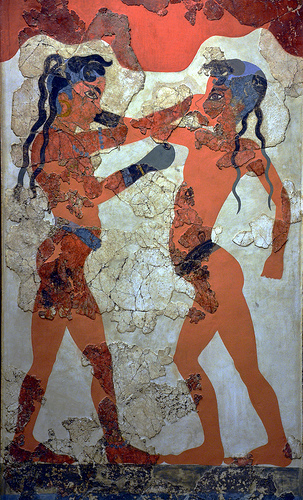Transitive and Intransitive Greek Verbs Posted by Ourania on Jan 30, 2017 in Grammar
In this post there is a list of common verbs that can be used with a direct object or without one. The object shows the person or the thing the action of the verb affects. When a verb is used without an object , it is the action of the verb that is important.
ανοίγω (to open)
- Ανοίγω τα παράθυρα. I am opening the windows.
The noun παράθυρα is the object of the verb ανοίγω.
- Η τράπεζα ανοίγει στις 8:30. The bank opens at 8:30.
In this case, the verb ανοίγω does not have an object. The focus is on the action of the verb.
κλείνω (to close)
- Κλείνω την πόρτα. I am closing the door.
- Το φαρμακείο κλείνει αργά. The pharmacy closes late.
βάφω (to paint)
- Ο Στέφανος βάφει το σπίτι. Stefanos is painting the house.
- Το κόκκινο κρασί βάφει. Red wine stains.
βράζω (to boil)
- Βράζουμε χόρτα. We are boiling greens.
- Το νερό βράζει εδώ και ένα λεπτό. The water is boiling for one minute.
γράφω (to write)
- Πότε θα γράψεις το email; When will you write the email?
- Γιατί γράφεις με μολύβι; Why are you writing with a pencil?
παίζω (to play)
- Τα παιδιά παίζουν ποδόσφαιρο. The children are playing soccer.
- Γιατί παίζει η τηλεόραση; Why is the television on? (Lit: why is the television playing?)
τρώω (to eat)
- Τρώμε μουσακά. We are eating mousaka.
2. Όταν είμαστε στην Ελλάδα, τρώμε πολύ! When we are in Greece we eat much!
πίνω (to drink)
- Χθες το βράδυ ήπια μία μπίρα. Last night I drank one beer.
- Η γυναίκα του τον άφησε γιατί έπινε. His wife left him because he used to drink.
καίω (to burn)
- Έκαψα το φαγητό γιατί έβλεπα τηλεόραση. I burned the food because I was watching television.
- Ο ήλιος καίει. The sun is burning (= too hot).
σταματάω (to stop)
- Ο αστυνομικός σταμάτησε τον άντρα. The policeman stopped the man.
- Το λεωφορείο σταματάει στο αεροδρόμιο. The bus stops at the airport.
ξεκινάω (to start)
- Ο Μιχάλης ξεκίνησε το αυτοκίνητο. Michalis started the car.
- Λυπάμαι, δεν μπορείτε να μπείτε. Το έργο έχει ξεκινήσει. I am sorry, you cannot go in. The movie has started.
καταλαβαίνω (to understand)
- Καταλαβαίνω τις ερωτήσεις. I understand the questions.
- Η Μαρία καταλαβαίνει. Maria understands (she shows understanding).
φτιάχνω (to make, fix)
- Φτιάχνεις κοσμήματα; Are you making jewelry?
- Ο καιρός φτιάχνει. The weather is getting better.

Build vocabulary, practice pronunciation, and more with Transparent Language Online. Available anytime, anywhere, on any device.





